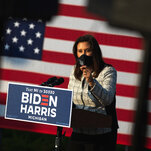
Republicans in the Legislature sued Ms. Whitmer in May over the executive orders, and last week opponents of her lockdown filed petitions with more than 500,000 signatures to repeal a 1945
Many groups in the anti-government movement call themselves militias, even if definitions vary widely. Although the Second Amendment guarantees the right to bear arms and mentions a “well regulated militia,” all 50 states have some manner of prohibition against private paramilitary groups.
Michigan has a long history of anti-government activity. A group known as the Michigan Militia dates to the early 1990s, when Timothy McVeigh and Terry Nichols, later convicted of carrying out the Oklahoma City bombing attack in 1995 that killed 168 people, attended a few of its early meetings. It resurfaced again around 2008 and 2009, with the election of Barack Obama as president.
More recently, armed groups of men began appearing at some demonstrations, most notably the 2017 march by white nationalists in Charlottesville, Va.
The upheavals in 2020 provided new impetus for anti-government groups to move from the online world to the streets. During protests against the virus lockdowns, they accused the government of overreach, suggesting that business closings and mask mandates were forms of tyranny.
That initial scattered presence mushroomed with the nationwide protests over social justice after George Floyd died at the hands of the Minneapolis police in May. When some protests degenerated into arson and looting, groups of men appeared on the streets, saying that they were there to protect homes and businesses that law enforcement could not.
The alleged plot in Michigan was infused with elements that have been the focus of anti-government extremists for years, said J.J. MacNab, a fellow at George Washington University’s Program on Extremism, such as accusing government officials of tyranny.